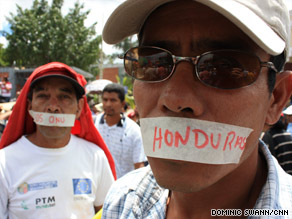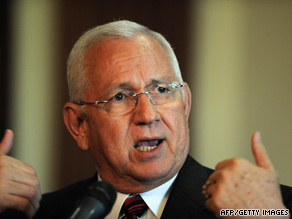Honduras revisits emergency decree as frustrations mount
- NEW: Repeal of law would not be immediate, pending legal review
- NEW: About-face is response to unrest when ousted President Zelaya returned
- The 45-day decree announced Sunday limits freedoms of expression, travel
September 29, 2009 -- Updated 0149 GMT (0949 HKT)

Pro-Zelaya demonstrators take to the streets Monday in Tegucigalpa, Honduras, on Monday.
The 45-day decree announced Sunday night forbids any unauthorized public gatherings, allows officials to make arrests without a judicial order and lets the government close down news media that threaten "peace and order."
Micheletti said he would consult with the supreme court to repeal the decree, following a meeting with the leading presidential candidates.
"This decision was made because (Zelaya) was calling for insurrection...but I'm going to listen to the other powers of the state and we're going to make the most wise decision in the interests of Honduras," Micheletti said, according to the newspaper La Prensa.
Monday marked the three-month anniversary of Zelaya's ouster June 28 in a military-led coup that has had many twists, but little progress toward an end to the country's political turmoil.
The slow progress appeared to frustrate one American diplomat.
Don't Miss
"We are looking increasingly foolish," he said during a closed session. He was not aware that microphones in the room were still live from a previous open session, and that his remarks were inadvertently recorded.
"What is the purpose of this declaration? It should've been a simple short 15 minute project. Should've been to reject the treatment of the OAS officials, the treatment they receive over the weekend," Amselem said, referring to an incident over the weekend where all but one of six OAS representatives were turned away from Honduras.
The U.S. official continued: "Reject the deterioration in human rights, as evidence of the decree of the the facto regime, and call (for) the respect for diplomatic immunity. That should've been it, that should've been it."
" Instead we now had day-long discussion, protracted debate in plain view of the world's press," Amselem said. "We made ourselves look foolish and impotent. I don't think that any amount of Viagra is going to turn that around."
In the wake of Micheletti's decree, Jose Miguel Insulza, secretary general of the OAS, said the Canal 36 TV station and Radio Globo were reported closed.
The owner of Canal 36, Esdras Amado Lopez, told CNN that 60 soldiers entered his station Monday morning to shut it down.
They removed all of the equipment, he said.
"They say that we offended the dignity of the president of Honduras, Roberto Micheletti," Lopez said, adding that he sees his station not as pro-Zelaya, but "pro-people."
Honduran soldiers were stationed in front of the shuttered TV and radio stations and would not allow anyone to enter, CNN correspondent John Zarrella reported.
Zelaya has been holed up in the Brazilian embassy since his covert return to his homeland.
On Monday night, he addressed the United Nations General Assembly via a mobile phone that his foreign minister held up at the podium, where he criticized the closures of the media outlets.
A "serious crime is taking place when the voice of the people is silenced and when the people who are being repressed are likewise silenced," Zelaya said.
The New York-based Committee to Protect Journalists also called for Canal 36 and Radio Globo, to be reopened. Two journalists covering the closures were assaulted by Honduran soldiers, the press freedom advocacy group said.
In a statement released Monday evening, the de facto government addressed the issue of the rejected OAS delegation, calling it a "distortion."
The OAS representatives are welcome to come to Honduras after this upcoming Friday, the statement said, adding that the de facto government had asked the OAS beforehand not to send anyone until the domestic actors had a chance to talk.
The statement came after Micheletti's news conference, but it nonetheless defended the security measures imposed by the de facto government.
Honduras has been in turmoil since Zelaya was forced out of the country and replaced hours later by legislative leader Micheletti.
The United Nations, the OAS and the European Union have condemned the coup and demanded that Zelaya be reinstated. Micheletti has vowed that Zelaya will never return to power and has said the deposed president will be arrested if he comes out of the Brazilian embassy in Tegucigalpa, the nation's capital.
Micheletti has accused Zelaya of using the embassy to instigate an insurrection and this weekend gave the Brazilian embassy 10 days to decide the ousted president's status.
Zelaya has publicly told his followers to avoid confrontations but called on them to march in Tegucigalpa on Monday for a peaceful takeover of the government.
U.S. to Honduras: End emergency decree now
- Roberto Micheletti said he would repeal decree but not be immediately

Pro-Zelaya demonstrators take to the streets Monday in Tegucigalpa, Honduras, on Monday.
Pro-Zelaya demonstrators take to the streets Monday in Tegucigalpa, Honduras, on Monday.
Robert Micheletti, de facto president of Honduras, says he'll repeal an emergency decree, but not immediately.
Earlier Monday, Roberto Micheletti announced he would repeal the law, but it would not be immediately. The decree will undergo a legal review, he said.
Still, Micheletti's announcement was an about-face. He had announced the policy less than 24 hours earlier in response to unrest that increased significantly after ousted President Jose Manuel Zelaya secretly returned to Honduras on September 20 and took refuge in the Brazilian embassy.
The 45-day decree announced Sunday night forbids any unauthorized public gatherings, allows officials to make arrests without a judicial order and lets the government close down news media that threaten "peace and order."
Micheletti said he would consult with the supreme court to repeal the decree, after a meeting with the leading presidential candidates.
"This decision was made because (Zelaya) was calling for insurrection ... but I'm going to listen to the other powers of the state and we're going to make the most wise decision in the interests of Honduras," Micheletti said, according to the newspaper La Prensa.
Monday marked the three-month anniversary of Zelaya's ouster in a military-led coup on June 28.
Don't Miss
The owner of Canal 36, Esdras Amado Lopez, told CNN that 60 soldiers entered his station Monday morning to shut it down. They removed all of the equipment, he said.
"They say that we offended the dignity of the president of Honduras, Roberto Micheletti," Lopez said, adding that he sees his station not as pro-Zelaya, but "pro-people."
Honduran soldiers were stationed in front of the shuttered TV and radio stations and would not allow anyone to enter.
The United Nations, the OAS and the European Union have condemned the coup and demanded that Zelaya be reinstated. Micheletti has vowed that Zelaya will never return to power and has said the deposed president will be arrested if he comes out of the Brazilian embassy in Tegucigalpa, the nation's capital.
Micheletti has accused Zelaya of using the embassy to instigate an insurrection and this weekend gave the Brazilian embassy 10 days to decide the ousted president's status. Brazil rejected the Honduran ultimatum.
On Monday night, Zelaya addressed the United Nations General Assembly via a mobile phone that his foreign minister held up at the podium.
A "serious crime is taking place when the voice of the people is silenced and when the people who are being repressed are likewise silenced," Zelaya said.

No comments:
Post a Comment